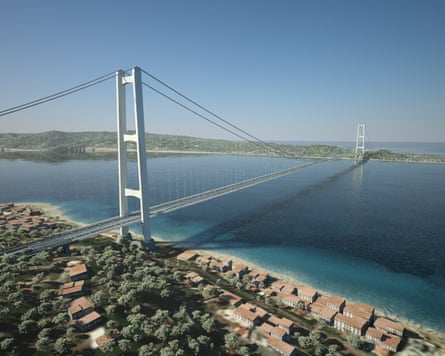The Italian government has given the final approval for the construction of a multibillion-euro bridge linking Sicily to the mainland, a project that has been a topic of debate since at least the late 1960s but has been held back by a litany of concerns, including the huge cost, seismic risks and mafia infiltration.
Giorgia Meloni’s rightwing government has set aside €13.5bn to build what would be the longest single-span bridge in the world. A dream of Italy’s late former prime minister Silvio Berlusconi and revived soon after Meloni’s government came to power in 2022, the 3.7km bridge and its surrounding facilities are expected to take 10 years to build.
Cars, trains and foot passengers currently cross the Strait of Messina, between the Sicilian city of the same name and Villa San Giovanni in Calabria, by ferry – a journey that takes about 30 minutes.
The green light for the bridge, which the government argues would give a much-needed economic boost to Italy’s poorer south, was given by an inter-ministerial committee on Wednesday, said the transport minister, Matteo Salvini, who is also the project’s chief backer. Salvini described it as “a metro over the strait”.
Salvini said the approval would need to be validated by the national audit court, which could take a few weeks, but said he was optimistic work would begin “in September or October”.
“The Strait of Messina is a project without precedent in the world,” Salvini told reporters. “This goal is to complete by 2032-33.”
Salvini added countering any attempt at criminal infiltration in the project would be the government’s “raison d’être”.
“We must monitor the entire supply chain to ensure it is impervious to criminals,” he said, adding if it was discovered that the mafia was involved then the bridge would not be built.
It will be constructed by a consortium led by Italy’s Webuild Group and including Spain’s Sacyr and the Japanese group IHI.
Pietro Salini, the chief executive of Webuild, said the project would be “transformative for the whole country”. The company estimates the bridge’s construction will create more than 100,000 jobs.
The approval will allow for preliminary works, including archaeological and geological surveys, to be carried out. An estimated 4,000 people on either side of the strait will be forced to leave their homes as part of an expropriation plan. They will be compensated, but this has not been enough to stop frequent protests against the bridge’s construction.
Despite Berlusconi’s attempts to approve the project during his three governments, it was rejected because of the high costs, engineering impracticability and the environmental impact.
Environmental associations this week filed a complaint with the EU, flagging serious risks for the local environment, while Angelo Bonelli, an MP for the Greens and Left Alliance, said the plan was “a colossal waste of money” and vowed to continue to fight against it. The area of the construction is also among those with the highest seismic risks in Europe.









